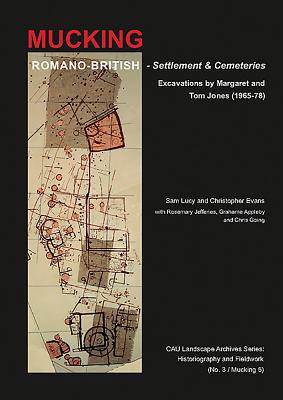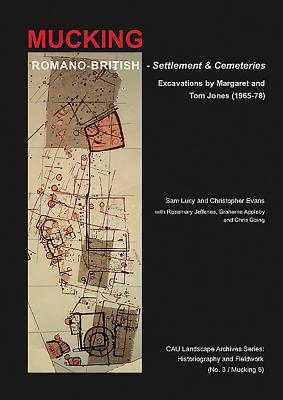
Bedankt voor het vertrouwen het afgelopen jaar! Om jou te bedanken bieden we GRATIS verzending (in België) aan op alles gedurende de hele maand januari.
- Afhalen na 1 uur in een winkel met voorraad
- In januari gratis thuislevering in België
- Ruim aanbod met 7 miljoen producten
Bedankt voor het vertrouwen het afgelopen jaar! Om jou te bedanken bieden we GRATIS verzending (in België) aan op alles gedurende de hele maand januari.
- Afhalen na 1 uur in een winkel met voorraad
- In januari gratis thuislevering in België
- Ruim aanbod met 7 miljoen producten
Zoeken
Romano-British Settlement and Cemeteries at Mucking
Excavations by Margaret and Tom Jones, 1965-1978
Sam Lucy, Christopher Evans
Hardcover | Engels
€ 55,95
+ 111 punten
Omschrijving
Excavations at Mucking, Essex, between 1965 and 1978, revealed extensive evidence for a multiphase rural Romano-British settlement, perhaps an estate center, and five associated cemetery areas (170 burials) with different burial areas reserved for different groups within the settlement. The settlement demonstrated clear continuity from the preceding Iron Age occupation with unbroken sequences of artifacts and enclosures through the first century AD, followed by rapid and extensive remodeling, which included the laying out a Central Enclosure and an organized water supply with wells, accompanied by the start of large-scale pottery production. After the mid-second century AD the Central Enclosure was largely abandoned and settlement shifted its focus more to the Southern Enclosure system with a gradual decline though the 3rd and 4th centuries although continued burial, pottery and artifactual deposition indicate that a form of settlement continued, possibly with some low-level pottery production. Some of the latest Roman pottery was strongly associated with the earliest Anglo-Saxon style pottery suggesting the existence of a terminal Roman settlement phase that essentially involved an 'Anglo-Saxon' community. Given recent revisions of the chronology for the early Anglo-Saxon period, this casts an intriguing light on the transition, with radical implications for understandings of this period. Each of the cemetery areas was in use for a considerable length of time. Taken as a whole, Mucking was very much a componented place/complex; it was its respective parts that fostered its many cemeteries, whose diverse rites reflect the variability and roles of the settlement's evidently varied inhabitants.
Specificaties
Betrokkenen
- Auteur(s):
- Uitgeverij:
Inhoud
- Aantal bladzijden:
- 456
- Taal:
- Engels
Eigenschappen
- Productcode (EAN):
- 9781785702686
- Verschijningsdatum:
- 4/11/2016
- Uitvoering:
- Hardcover
- Formaat:
- Genaaid
- Afmetingen:
- 213 mm x 300 mm
- Gewicht:
- 1927 g

Alleen bij Standaard Boekhandel
+ 111 punten op je klantenkaart van Standaard Boekhandel
Beoordelingen
We publiceren alleen reviews die voldoen aan de voorwaarden voor reviews. Bekijk onze voorwaarden voor reviews.









